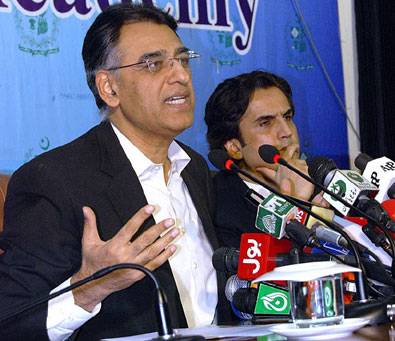ISLAMABAD - The US dollar hit an all-time high of Rs144 in interbank market on Friday, suggesting the government has accepted IMF demand of devaluing rupee to Rs145 against dollar.
But Finance Minister Asad Umar rejected this impression saying the “issue of dollar is associated with supply and demand".
As part of its engagement with Islamabad for a loan programme, the International Monetary Fund (IMF) had recently asked Islamabad to devalue rupee.
The US dollar, which was traded at Rs134 on Thursday, took the sharp jump to Rs144 on Friday but settled at Rs139 later at the end of the day – which still meant a big 3.8 percent rise.
Pakistani currency is under pressure since last one year as it gone up to Rs139 in November 2018 from Rs105 in same month last year.
The rupee has erased more than a fifth of its value to become the worst performer in Asia this year, according to a basket of 13 currencies compiled by Bloomberg.
Countries latest economic crisis emerged after the current account and budget deficits widened and the foreign reserves dropped to a four and a half year low.
As for the impact of recent value plunge, it would fuel the inflation – which had touched 6.8 percent in October, the highest level in last four years.
Also, the massive depreciation in value would enhance the volume of public debt by Rs475 billion, as one percent depreciation in currency adds Rs95 billion in public debt.
“The currency adjustment is in line with our expectations of the need for a weaker rupee in the context of ongoing IMF negotiations,” said Bilal Khan, a senior economist at Standard Chartered Plc in Dubai.
But Finance Minister Asad Umar categorically denied the rupee depreciation had any link with IMF negotiations.
“The IMF did not give us a target for the rupee value,” he said and added that Pakistan and IMF held discussions over the system of exchange rate,” he told a press conference.
Flanked by Minister for Planning and Development Khusro Bakhtyar and Minister of State for Revenue Hammad Azhar, Asad Umar informed the media that federal government does not interfere in market in settling currency value.
The State Bank of Pakistan (SBP) sets the exchange rate and interest rate. The SBP is free to make its own decisions, he added.
Pakistan’s foreign exchange reserves are under pressure due to massive increase in current account deficit, which had ballooned to $19 billion last fiscal year. He explained that federal government would not control the currency value artificially, as the previous government did.
Umar criticised the PML-N government for its flawed economic policies. The PML-N government had artificially controlled the dollar value, which had resulted into reduction in prices of imported commodities.
"We artificially increased the value of rupee by purchasing dollars. As a result, we started importing vegetables and we were unable to export surplus sugar and wheat without providing subsidiary," the minister said.
He said that the former government had subsidised foreign traders and taxed the locals. The gap between supply and demand of dollar will continue till we address the issue of production and foreign investment, he added.
Talking about the government’s plan, he informed that the prime minister had directed the government to increase the foreign remittances, exports and foreign investment to control the current account deficit.
The incumbent government had taken several measures to enhance the exports by reducing cost of doing business. He said that government had issued the tax refunds of Rs8.5 billion last month, which need to be accelerated to overcome the issues of exporters.
“Our exports have increased, so have the investments. Foreign investment has also improved and we will soon see more investments from different countries,” he added.
The finance minister said that rupee value cannot be controlled artificially for a long run. Even during the PML-N's tenure, the value of rupee against dollar had started increasing as it had gone up from Rs105 in November 2017 to Rs128 when PTI government took charge.
He admitted that devaluation is not a good thing to do, as it increases the inflation in short-run. However, the devaluation along with other policies adopted by the PTI-led government would produce positive results, he added.
Umar said that negotiations with China and United Arab Emirates (UAE) for financial package were in advance stage and were expected to finalise within ongoing month of December.
He clarified that Pakistan had not sought any financial assistance package from Malaysia during recent visit of Prime Minister Imran Khan.
To a question about increase in budget deficit, the minister said that deficit had widened during first quarter (July to September) of the current fiscal year due to rupee depreciation that enhanced the defence expenditures and interest payment.
Federal Minister for Planning and Development Khusro Bakhtyar said that saving to GDP ratio is very low in Pakistan, as it is only 10 percent when, for example, India’s is 30 percent.
He further said that consumption is very high as it is 93 percent in Pakistan as compared to 59 percent in India and 64 percent in Bangladesh.
He said that Pakistan had failed to increase it exports while other countries increased their exports massively. The government could save its import bill by $5-$6 billion by setting up an oil refinery in the country, he added.
Bakhtyar said that incumbent government has signed agriculture framework with China under China Pakistan Economic Corridor (CPEC). The government is also working for a socio-economic framework.
Rupee falls to all-time low against dollar






